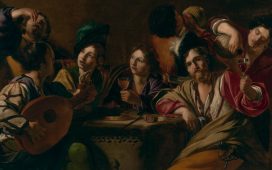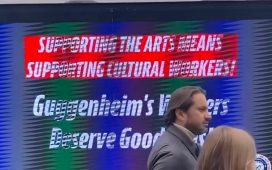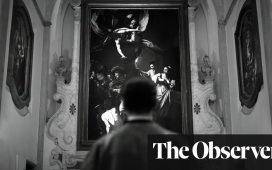There is a seam of dark humour whenever the Slovenian artist Jasmina Cibic is preparing to show her work in certain European countries. “They’re firing so many museum directors,” she says, with a brittle smile, “so we had this joke, that my show was going to be the last one for that director’s career.”
Cibic points to what has been happening in Hungary and Poland, where rightwing governments have attacked the arts, sacking museum and theatre directors, silencing writers and putting pressure on galleries. Even in Britain, which may be far less authoritarian but is prone to populist nationalism, Cibic has met obstacles. After Brexit, she says, “I lost [some exhibitions] in English museums, and I was told that they will reprogramme to suit local and national interests.” She smiles. “With the nature of my work, it couldn’t be more bizarre.”
Cibic is inspired by the European identity crises of the 20th century, and how culture can be “hijacked by ideology”. She has focused her recent work on the idea of “cultural gifts” – such as a building, piece of music, or art – and what they mean to a regime’s power and ability to buttress cultural identity and nationalism. Her film The Gift is one of several works that helped her to win this year’s Jarman award, the annual prize for artists working with moving images.
Beautifully filmed, featuring music and dance, and set in locations that were themselves political gifts – Oscar Niemeyer’s building for the French Communist party in Paris, the Palace of Nations building in Geneva, and the Palace of Culture and Science in Warsaw, “gifted” by Stalin – The Gift tells the story of a competition to create a singular piece of art to “hold our nation together”, or as one character says, to show “who we are and who we want to be”. An artist, engineer and diplomat each state their case to four judges, in a film that questions what art means to a country (“dynamism in art and culture creates dynamism in a nation”, as one judge puts it), what future generations will make of such a cultural gift, and what “obligations” come with it. In a previous work, the film trilogy Nada, Cibic explored iconic architecture and national identity, again looking at key moments in 20th-century European history.
Cibic, who was born in Ljubljana in 1979 when it was part of the former Yugoslavia, has been looking at the notion of “soft power” and the way culture is used for political gain since at least 2013, when she represented Slovenia at the Venice Biennale. “It felt at that time we were already feeling the new nationalism in eastern Europe starting to bubble up. I looked only at local specifics of Slovenian icons, successful and failed ones.” She wallpapered her pavilion with illustrations of what she calls “local Hitler bugs” – beetles, native to Slovenia, named after Hitler in the 1930s – and still-life paintings that hang in her country’s government buildings. “Everything had to do with how Slovenia chose, through time, to represent itself through culture.”

She became, she says, more drawn to “identity crises of Europe, because that’s usually when culture gets called, to kind of try to fix something”. The script for The Gift, as in some of her previous work, is made with fragments of political speeches and debates – the result of years of international archive research by Cibic and her team.
We meet in her London studio. Cibic, dressed in black, is warm, funny and an energetic speaker. With The Gift, she also wanted to look at “our responsibility as artists in this whole situation. With commissions, it’s easy to say: ‘I was commissioned.’ But with this idea of these ‘gifts’, there’s more at stake. Where are we willing to go? Because there is no such thing as clean money, there is no such thing any more as non-political engagement. Whatever we do is political.”
She comes, she says, from a politically engaged family. “My grandparents were all partisans, they all fought in anti-fascist struggles in the former Yugoslavia.” Her father was a teacher, who taught work by Marx and Engels “until the system collapsed”. His books were relegated to a lower shelf, and Cibic’s rabbit ate them. Both her parents would have liked to have worked in culture, she says, but her grandparents “were red bourgeoisie. They bought art as wedding gifts. You don’t do art, you buy it.”
Cibic was 11 when the first of the Yugoslav wars broke out – Slovenia’s 10-day conflict with the Yugoslav army after its declaration of independence in 1991. She was relatively untouched by that conflict, but sees that among other artists of her generation from the former Yugoslavia, “loads of us are now living abroad, and really dealing with the legacy”.
The former Yugoslavia fascinates her, partly because she thinks its failure should act as a lesson. “The collapse of Europe that’s happening in front of our eyes is what Yugoslavia was going through, along the lines of the uprise of nationalism, of ‘let’s not spend money abroad’,” particularly in international cultural projects, she says. “In the late 60s, nationalism started flaring up, so the Yugoslav diplomacy decides to start big building projects at home to [honour] the anti-fascist struggle – big monuments were built and so on. But the idea of being present abroad subsides.”
Cibic has seen friends from mainland Europe leave the UK, post-Brexit. She has been here for 20 years, and has a 12-year-old daughter, but she says that, like many other artists from EU countries living in Britain, she felt “the ground shatter” when the result of the referendum was announced. Winning the Jarman award, she says, has given her a strong sense that she does, in fact, belong here. Besides, Cibic says, she is more concerned for younger artists. She says that, for the first time she has noticed students she teaches seeming depressed “in terms of what is possible. If you don’t have this internationalism, this cross-pollination, we’re treading back so much.”
Cibic is an internationalist – she is getting ready to show in New Zealand – and in terms of her new work there is, she says, a feeling of urgency. She relies on being able to sift through archives and her films are so site-specific, working with architecture that “used to – or still does – represent national or transnational authorities. I see a worrying trend of closing off access to the questioning” of what those spaces mean. “I don’t have a project that I’m like, ‘Oh, I will do it in five years’ time.’ It needs to be done now.”








